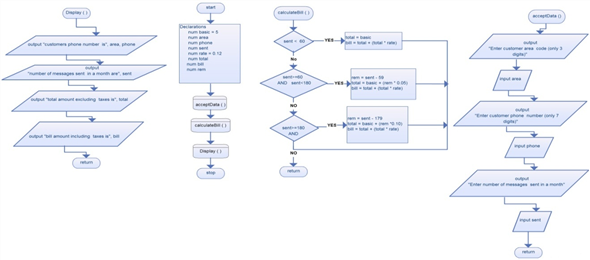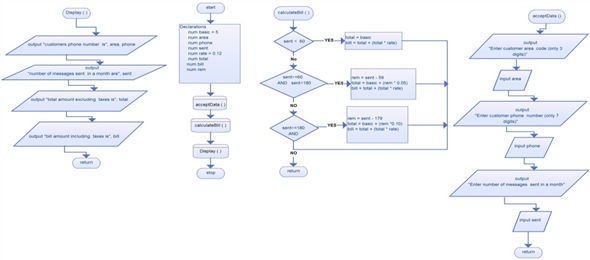
Programming Logic and Design, Introductory 7th Edition by Joyce Farrell
Edition 7ISBN: 1285225562
Programming Logic and Design, Introductory 7th Edition by Joyce Farrell
Edition 7ISBN: 1285225562The Dash Cell Phone Company charges customers a basic rate of $5 per month to send text messages. Additional rates are as follows:
• The first 60 messages per month, regardless of message length, are included in the basic bill.
• An additional five cents is charged for each text message after the 60th message, up to 180 messages.
• An additional 10 cents is charged for each text message after the 180th message.
• Federal, state, and local taxes add a total of 12 percent to each bill.
Design a flowchart or pseudocode for the following:
a. A program that accepts the following data about one customer’s messages: area code (three digits), phone number (seven digits), and number of text messages sent. Display all the data, including the month-end bill both before and after taxes are added.
b. A program that continuously accepts data about text messages until a sentinel value is entered, and displays all the details.
c. A program that continuously accepts data about text messages until a sentinel value is entered, and displays details only about customers who send more than 100 text messages.
d. A program that continuously accepts data about text messages until a sentinel value is entered, and displays details only about customers whose total bill with taxes is over $20.
e. A program that prompts the user for a three-digit area code from which to select bills. Then the program continuously accepts text message data until a sentinel value is entered, and displays data only for messages sent from the specified area code.
Step 1 of 20
a.
Flowchart:
The flowchart accepts the customer data and displays the customer phone number, area code, number of messages sent, monthly bill including and excluding taxes. The flowchart calls the subroutines acceptData(), calculateBill(), Display().

Flowchart to display the customer phone number, area code, number of messages sent, monthly bill including and excluding taxes. It represents subroutine Display().

Step 2 of 20
Step 3 of 20
Step 4 of 20
Step 5 of 20
Step 6 of 20
Step 7 of 20
Step 8 of 20
Step 9 of 20
Step 10 of 20
Step 11 of 20
Step 12 of 20
Step 13 of 20
Step 14 of 20
Step 15 of 20
Step 16 of 20
Step 17 of 20
Step 18 of 20
Step 19 of 20
Step 20 of 20
Why don’t you like this exercise?
Other


